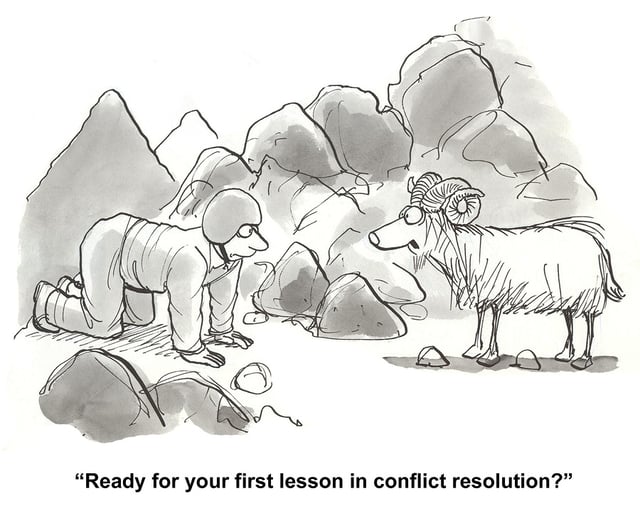From petty squabbles over where to order lunch or who had which file last, conflict in your workplace can derail your efforts and destroy your productivity. Even worse, a workplace with too much conflict is simply not an ideal place to spend time. In fact, if conflict resolution isn't utilized then the discord will fester and not be properly resolved. It can result in poor morale, high turnover and a sick, sad workplace culture.
 Taking steps to address and alleviate conflict can make things better for everyone and for your organization as well. When unspoken, unresolved conflict is brewing, even minor issues can turn into major confrontations and impact your team’s ability to work together productively and to keep things moving along as they should. Understanding why workplace conflict happens and how different personalities impact conflict in the workplace, you can help your team address and resolve the issues that arise. You’ll love having a more harmonious workplace and your team will be better equipped to collaborate and get things done.
Taking steps to address and alleviate conflict can make things better for everyone and for your organization as well. When unspoken, unresolved conflict is brewing, even minor issues can turn into major confrontations and impact your team’s ability to work together productively and to keep things moving along as they should. Understanding why workplace conflict happens and how different personalities impact conflict in the workplace, you can help your team address and resolve the issues that arise. You’ll love having a more harmonious workplace and your team will be better equipped to collaborate and get things done.
Types of Workplace Conflict
There are only a few basic types of conflict encountered in most workplaces; most disputes fall into one of these categories.
Performance conflict: Someone is not pulling their weight or is not meeting expectations. Whether there is shoddy work, too many missed deadlines or simply a lack of attention to detail, your team will have issues if there are uneven expectations or performances that are not addressed.
Relationship Conflict: Differences in personality style and perspectives make it difficult for team members to get along and communicate well. Disputes can take any form, but the underlying differences in attitude, personality style and communication abilities are the root of most relationship based conflict in the workplace.Whether someone is perceived as a “favorite” of the boss or is not pulling their weight or there are just diverse personality types interacting without support or understanding, the result is the same. Discord, conflict and even outright chaos can impact your entire organization and make it difficult to get things done and reach the goals you’ve set for your team.
The DISC Model Can Help
The DISC assessment is designed to provide insight into the personalities, preferences and styles of the people working for you. When you know that an individual is logical, needs routine and prefers to work alone, you know not to challenge them with an overcrowded workplace and sensory overload.
Those outgoing optimists on your team, on the other hand, will wilt if you isolate them and give them too many detail oriented tasks. Mismatching a team member’s DISC style with their workplace environment and setup can cause plenty of conflict, as the individual will already feel out of their element and on edge.
What is the DISC model?The DISC model is a simple assessment that can help define those important preferences and give you the information you need to help your team succeed. DISC is often used in the workplace setting to set teams and individuals up for success and to navigate areas of conflict. Learning your own team’s unique DISC styles can help you be a better manager and help them have a better, more successful work experience.
4 Personality Types at Work

Every person has a unique blend of characteristics from each of the DISC personality types, but most of us tend to be strong in one area. Understanding if your employee is a D, I, S or C type will help you navigate conflict and set them up to perform their best. A look at each style, along with how they cope with conflict, is described below.
Dominant, or D-Style Employees
These individuals are high achieving and direct to the point of abruptness and the most likely to set and work towards their own firm goals.
Conflict can arise, though, if this team member thinks others are not pulling their weight or making timely decisions. The hard driving, dominant D-style worker could just charge in and fix things themselves. Other, more passive or people pleasing styles can easily be intimidated or steamrolled by this sometimes aggressive worker.
When conflict arises with a high-D style person, the best approach is to be direct; they can react aggressively and harshly when criticized. This person wants to get to the point and resolve things as quickly as possible. If there is a voice raised in the office, it likely belongs to your D-style team member. Calm, rational and direct intervention is required when conflict involves this outspoken achiever.
Influential or I-Style Employees
These easily excitable employees are also likely to speak up when challenged or upset. More prone to outbursts and dramatics than other styles, they are also more likely to be upset by perceived personal slights or feeling that another employee is getting undeserved accolades.
This team member is social, but has initiative and can work independently. They’ll want to talk things through, hash them out and may be regretful after an argument or conflict. Offer this team member support by taking the time to talk things over and air what they are feeling. This highly excitable and sometimes competitive team member needs to feel heard when there is a conflict.
Steadiness, or S-Style Employees
This worker is less likely than others to engage in direct conflict with others, but they could be seething and nurturing hurt feelings under the surface. They are passive and can be resistant to change, so even minor changes in procedure or routine can be surprisingly upsetting to this otherwise steady employee.
To avoid conflict and hurt feelings, plenty of notice of pending changes to anything from workflow to the snacks in the vending machine will help this otherwise cheerful worker cope. They are also quite people-focused, so taking the time to allow them to speak and assuring they are not talked over by more dominant personality types can help you resolve conflict. These friendly folks can allow resentment to fester until there are actual tears over something as simple as a misplaced file or missing pencil case.
Conscientious, or C-Style Employees
This work-focused team member can become overly critical when challenged or when they think that others are not pulling their own weight. They’re practical and logical and do best when left to their own devices. The C-style employee may also resist change or perceived criticism, so getting to the point and explaining the “why” is often important. The C-style worker will often want proof or evidence of a problem and will resist intangible complaints or become reclusive if there is conflict.
This team member can seem cold or even harsh to other workers and may be accused of being rude. Giving them a chance to air any issues and then ensuring others involved in the conflict are given the chance to weigh in as well can help resolve problems in the workplace when a C-style person is involved.
Using DISC for a Conflict Free Workplace
 Understanding the different personality types of your team can help you spot signs of trouble early on, and give you the right approach for dealing with conflict individually or in groups. The direct, detailed approach that works so well with a D or C type will flat out fail with one of the other types, even if you are dealing with the same type of conflict or situation. In contrast, if you take a more people oriented “talk it out” approach with your I and S team members, they’ll have a chance to be heard.
Understanding the different personality types of your team can help you spot signs of trouble early on, and give you the right approach for dealing with conflict individually or in groups. The direct, detailed approach that works so well with a D or C type will flat out fail with one of the other types, even if you are dealing with the same type of conflict or situation. In contrast, if you take a more people oriented “talk it out” approach with your I and S team members, they’ll have a chance to be heard.

